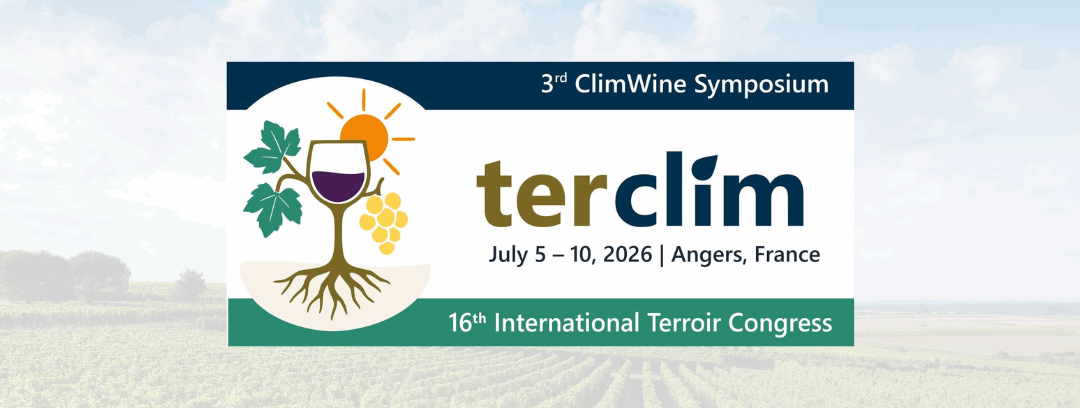IVES is proud to collaborate with Terclim26 conference that will take place the 5th of July to the 10th, 2026 at the Ecole Supérieure des Agricultures in Angers (France).


IVES is proud to collaborate with Terclim26 conference that will take place the 5th of July to the 10th, 2026 at the Ecole Supérieure des Agricultures in Angers (France).
The Fresh Mushroom Off-Flavor (FMOff) is a concerning undesirable aroma in wine specific of certain vintages, characterized by a typical button mushroom aroma. The appearance of this off-flavor is linked to the presence of certain fungus on the grape [1-3].
Production, demand, and brand awareness of dealcoholized wine (<0.5% v/v) is steadily increasing worldwide. However, there have been few studies to date investigating and comparing the different physical processes for dealcoholizing wine.
Oak wood has a significant impact on the chemical composition of wine, leading to transformations that influence its organoleptic properties, such as its aroma, structure, astringency, bitterness and color. Among the main extractible non-volatile polyphenol compounds released from oak wood, the ellagitannins are found [1].
Adopting disease-tolerant varieties is an efficient solution to limit environmental impacts linked to pesticide use in viticulture. In most breeding programs, these varieties are selected depending on their abilities to tolerate diseases, but little is known about their behaviour in response to abiotic constraints.
The global non-alcoholic wine market is projected to grow from USD 2.7 billion in 2024 to USD 6.97 billion by 2034, driven by health awareness, lifestyle shifts, and religious factors [1-3]. Consequently, the removal of alcohol can significantly alter the key quality parameters of wine.
Dealcoholization of wine has gained increasing attention as consumer preferences shift toward lower-alcohol or
alcohol-free beverages. This process meets key demands, including health-conscious lifestyles, regulatory
compliance, and the expanding non-alcoholic market [1-3].
Elemental sulfur is commonly used in vineyards as a fungicide to prevent diseases and protect grapevines.1 The challenges of climate change are intensifying disease pressure, further increasing the reliance on sulfur use. Understanding the range of potential impacts of residual sulfur during the winemaking process is becoming increasingly important.
Climate change and the growing need to reduce the use of phytosanitary products demand the exploration of disease-resistant grape varieties and/or adapted to drought conditions.
Fluorescence spectroscopy combined with chemometrics has shown advantages in wine analysis due to being rapid, sensitive, and selective to fluorescent molecules. Especially due to the abundant phenolic compounds [1], the molecular fingerprints afforded by fluorescence spectroscopy can potentially be used to discern and track the change of wine composition, with two innovative investigations having been implemented.
The occurrence of aroma and macromolecule constituents in sparkling wines, directly influencing their organoleptic characteristics, is affected by several factors, including the grape cultivar, base-wine particularities, inoculated yeasts, the aging time, and winemaking practices [1].
Effervescence and foaming properties are the main visual characteristics assessed by the consumer during
sparkling wine tasting.
During red wine aging, numerous chemical reactions occur, contributing to the modification and enhancement of the wine sensory parameters over time [1].
Fruity aromas, characterized by red and black fruit descriptors, are central to the identity of Bordeaux red wines [1,2]. Despite extensive research focused on identifying and quantifying volatile compounds that contribute to fruity aromas in wine, the mechanisms underlying their interactions and sensory perception remain poorly understood [3].
The analysis of polyfunctional thiols in wine is challenging due to their low abundance and instability within a complex matrix. However, volatile thiols are highly aroma-active, making their accurate quantification in wine at low concentrations crucial [1].
One of the major issues for wine production in Australia is the management and eradication of powdery and downy mildews and the associated yield losses they present, costing Australian grape growers upwards of AUD$160M per annum [1].
During alcoholic fermentation, acetaldehyde is the carbonyl compound quantitatively the most produced by yeasts after ethanol. The dynamics of acetaldehyde production can be divided into 3 phases. Early formation of this compound is observed during the lag phase at the beginning of fermentation before any detectable growth [1].
Planted between 2018 and 2019, the ‘New Vine’ system is a vineplot, comprising 169 individuals genotypes (5 vines/individual), located on a gravelous soil, in the INRAE Grande-Ferrade site (Villenave d’Ornon, France).